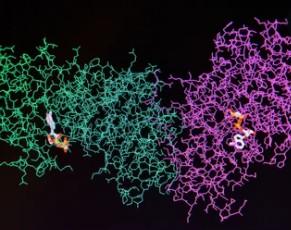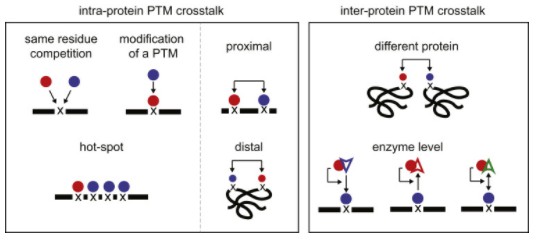
- Home
- Bioinformatics
- Protein PTM Crosstalk Analysis

In recent years, the development of post-translational modification (PTM) co-occurrence identification strategies has revealed a wealth of information about the interaction between PTMs. There is growing evidence that PTM crosstalk is involved in the development and progression of various diseases. As a leading custom service provider of PTM analysis, Creative Proteomics now offers protein PTM crosstalk analysis services. Based on proteomic technologies, advanced mass spectrometry (MS) instrumentation, and popular bioinformatics tools, we can achieve proteome-wide identification of PTM crosstalk through measurements of PTM sites. We are committed to helping our clients gain insight into the complexity of PTM crosstalk and to help understand how the interactions between PTMs relate to physiological or pathological states, thereby facilitating the development of new targets for drug therapy.
 Fig. 1
Different modes of PTM crosstalk are separated based on intra- or inter-protein crosstalk. (Leutert, Mario, Samuel
W. Entwisle, and Judit Villén, 2021)
Fig. 1
Different modes of PTM crosstalk are separated based on intra- or inter-protein crosstalk. (Leutert, Mario, Samuel
W. Entwisle, and Judit Villén, 2021)
To investigate PTM crosstalks at the proteomic scale, we mainly apply MS-based proteomics approaches. This technique not only identifies thousands of PTMs at a single amino acid resolution but also quantifies PTMs at different proteomics states. By combining modified peptide enrichment strategies (such as affinity purification and size-exclusion chromatography) and MS-based analysis, we can achieve a systematic analysis of protein PTM states in protein complexes or cellular structures, allowing the identification of interdependent or mutually exclusive PTMs that may reveal crosstalk between and within proteins that form complex assembly and composition. Specifically, our one-solution service includes sample preparation, enrichment of multiple modified peptides (parallel or serial enrichment), deep peptide fractionation, MS-based multiple modified peptide identification, and PTM crosstalk bioinformatics analysis. Moreover, we are able to perform PTM network analysis, PTM functional association, and PPI networks, facilitating a comprehensive and in-depth study of PTM crosstalk analysis.
Since PTMs often occur as a coordinated event through several PTM crosstalks. In order to gain a better knowledge of proteoforms, MS-based PTM analysis should further consider the co-regulation of PTMs at the protein scale. Due to the functional limitations of the commonly used bottom-up approach, we also provide both middle-down and top-down MS-based analysis to help our customers explore a more complete view of the role of PTM crosstalk effects in biological processes and pathologies. In addition, PTM crosstalk analysis is challenging, and association studies using large data from biological databases using bioinformatics analysis are an effective way to investigate PTM crosstalk in greater depth through selective target selection. For more information on our services, please use our contact form. Our professional staff is looking forward to working with you on your next projects.
Reference
Our products and services are for research use only.